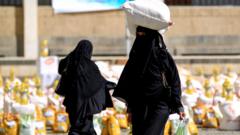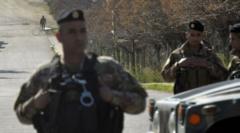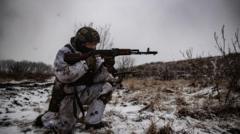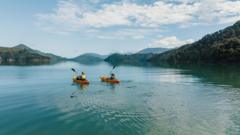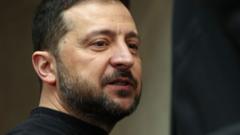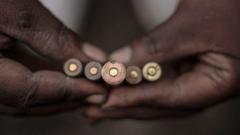The ongoing struggle in the eastern Democratic Republic of Congo escalates as government forces withdraw, leading to an alarming humanitarian situation.
**M23 Rebels Capture Bukavu: Rising Tensions in DR Congo and Rwanda Conflict**
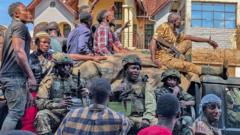
**M23 Rebels Capture Bukavu: Rising Tensions in DR Congo and Rwanda Conflict**
M23 rebels backed by Rwanda have taken control of Bukavu, heightening fears of a regional conflict as civilians flee and chaos ensues.
In a significant escalation of violence in the eastern Democratic Republic of Congo (DRC), the Rwandan-backed M23 rebels have successfully seized control of Bukavu, the nation's second-largest city. Initial reports indicate that M23 fighters entered the city without facing resistance, cheered by some residents amidst the unfolding chaos. This takeover marks the second major urban area to fall to the rebels, following Goma, intensifying fears of a larger conflict in the region.
The Congolese government has openly acknowledged the loss of Bukavu, urging residents to remain indoors to avoid potential confrontations with the occupying forces. Meanwhile, the United Nations and European nations have expressed grave concerns about the conflict's humanitarian impact, warning that it could trigger a broader regional war.
A local resident, who wished to remain anonymous due to safety concerns, described the situation as volatile, with scenes of uncontrolled gunfire and looting occurring throughout the city. The M23's advance began with the capture of Bukavu's airport, subsequently leading to their entry into the city center. As the Congolese military withdrew from urban areas to prevent further violence, a power vacuum resulted in chaotic scenes, including a reported prison break and massive food theft from a UN World Food Programme warehouse.
The national government views the M23's territorial gains as a significant blow to President Félix Tshisekedi's administration. Government representatives have condemned Rwanda for allegedly instigating instability in the DRC, asserting that its pursuit of territorial control is aimed at exploiting the region's rich natural resources.
Rwandan President Paul Kagame, however, maintains that his country's actions are driven by security motives, stemming from perceived threats posed by various armed groups operating within Congolese territory. Tensions between the two nations have a long history, tracing back to the Rwandan genocide of 1994, which resulted in a regional power dynamics laden with distrust.
As international scrutiny increases, the African Union has called on the M23 rebels to disarm, reflecting concerns about the potential for an expansive regional conflict. With both sides entrenched in their positions, the outlook for peace remains uncertain as humanitarian needs escalate amid the turmoil.
The Congolese government has openly acknowledged the loss of Bukavu, urging residents to remain indoors to avoid potential confrontations with the occupying forces. Meanwhile, the United Nations and European nations have expressed grave concerns about the conflict's humanitarian impact, warning that it could trigger a broader regional war.
A local resident, who wished to remain anonymous due to safety concerns, described the situation as volatile, with scenes of uncontrolled gunfire and looting occurring throughout the city. The M23's advance began with the capture of Bukavu's airport, subsequently leading to their entry into the city center. As the Congolese military withdrew from urban areas to prevent further violence, a power vacuum resulted in chaotic scenes, including a reported prison break and massive food theft from a UN World Food Programme warehouse.
The national government views the M23's territorial gains as a significant blow to President Félix Tshisekedi's administration. Government representatives have condemned Rwanda for allegedly instigating instability in the DRC, asserting that its pursuit of territorial control is aimed at exploiting the region's rich natural resources.
Rwandan President Paul Kagame, however, maintains that his country's actions are driven by security motives, stemming from perceived threats posed by various armed groups operating within Congolese territory. Tensions between the two nations have a long history, tracing back to the Rwandan genocide of 1994, which resulted in a regional power dynamics laden with distrust.
As international scrutiny increases, the African Union has called on the M23 rebels to disarm, reflecting concerns about the potential for an expansive regional conflict. With both sides entrenched in their positions, the outlook for peace remains uncertain as humanitarian needs escalate amid the turmoil.



